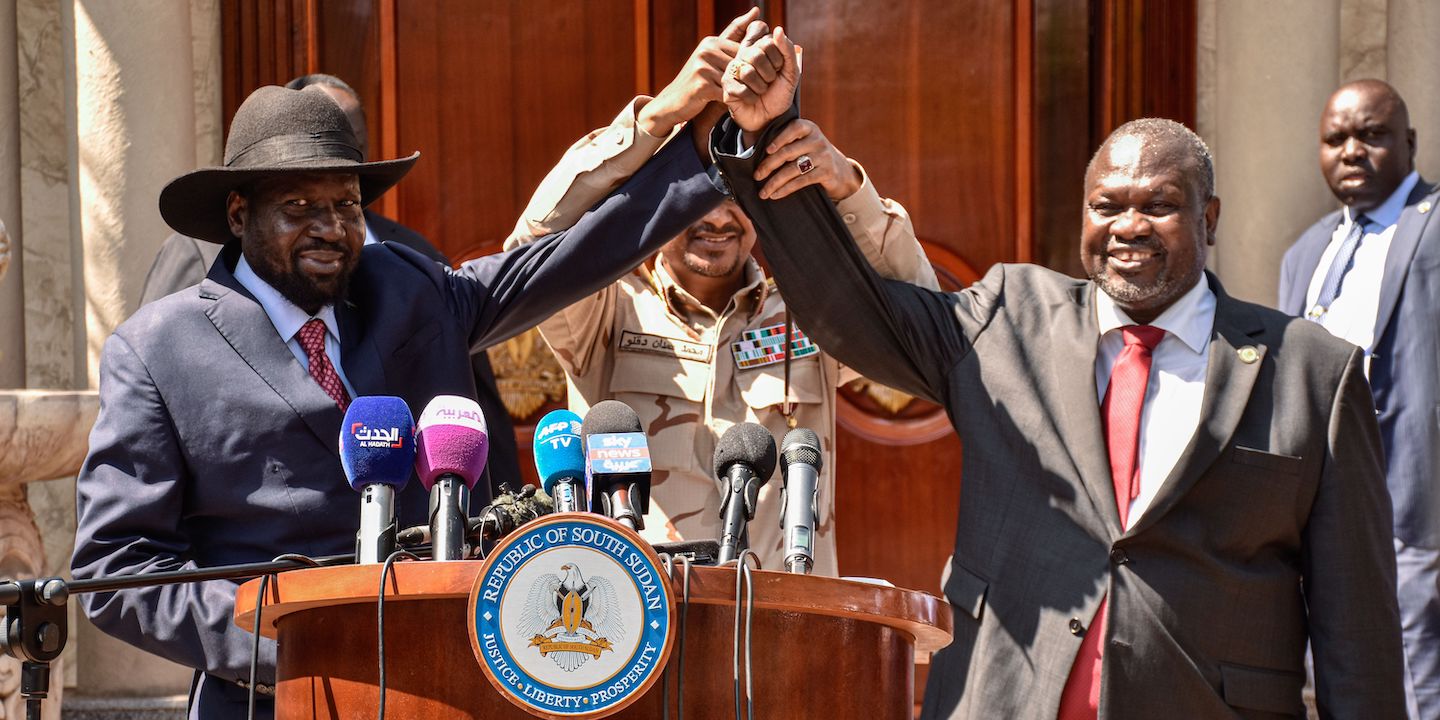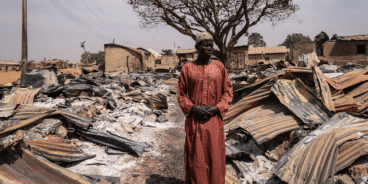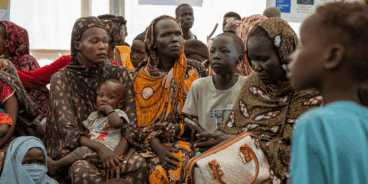

All forgiven? South Sudan’s Transitional Government and the recurring risk of atrocities
After an almost seven-month delay, on 22 February South Sudan formed a new Transitional Government of National Unity (TGoNU), reuniting long-term rivals and former enemies President Salva Kiir and opposition leader Riek Machar. Although this constitutes a major breakthrough in the peace process, many questions remain regarding the impact this reunion will have on the long-term stability of South Sudan. Will the two leaders finally be able to resolve contentious issues while sharing power, or will the country return to violence and bloodshed?
During South Sudan’s five-year civil war, government forces and armed opposition groups perpetrated war crimes and crimes against humanity, including widespread extrajudicial killings, torture, child abductions and sexual violence. Since 2013 an estimated 400,000 people have been killed and 4 million have fled their homes, contributing to 4.5 million people being food insecure and 860,000 children being malnourished. Despite the signing of numerous peace agreements between August 2015 and September 2018, atrocities continued. Throughout the process Kiir and Machar continued to focus on the preservation of their personal power, allowing their mistrust of each other to reinvigorate ethnic tensions and inspire violence across the country.
The formation of the TGoNU is cause for hope that the commitment to the Revitalized Agreement on the Resolution of the Conflict in the Republic of South Sudan (R-ARCSS) is genuine and sustainable. However, the failure of Kiir and Machar to address key provisions of the agreement significantly delayed the process. But progress was also impeded by the complexity of the tasks at hand. How, for example, do you rapidly form a unified force of 83,000 soldiers from splintered groups that were at war with each other until recently? And how do you overcome this challenge when you also lack the capacity for training or to provide basic resources for the troops like food, water and a salary? Additionally, what is the best way to re-establish state boundaries given their implications for the balance of power and access to resources in a divided country?
These questions remain unanswered and the TGoNU has a huge task ahead in ensuring that the country does not descend into atrocities once again. Two previous attempts at sharing power have failed, and these unresolved issues could potentially endanger South Sudan’s fragile peace. The international community has applauded Kiir and Machar for forming a new government, but it must continue to put diplomatic pressure on these two men to ensure that all parties are held accountable for their role in atrocity crimes perpetrated during the civil war.
Fulfilling the promise of the R-ARCSS
Building sustainable peace in South Sudan will require Kiir and Machar to overcome their political rivalry and make progress on three outstanding issues mandated by the R-ARCSS: the unification of forces into a national army, the number and boundaries of states, and the creation of mechanisms to hold accountable perpetrators of crimes during the civil war. Left unresolved, these issues could exacerbate friction amongst South Sudan’s ethnically diverse population, imperiling the survival of the TGoNU and the potential for a lasting peace.
In the past, a lack of unified command structure in the Sudan Peoples’ Liberation Army allowed sections to organize along ethnic lines. This ultimately resulted in clashes between those loyal to Machar (predominantly ethnic Nuer troops) and troops loyal to Kiir (predominantly composed of ethnic Dinka).
The R-ARCSS is supposed to end, once and for all, the ethnic segmentation and divided loyalties of South Sudan’s soldiers. Although parties to the R-ARCSS agreed to unify their forces into a national army, those loyal to Machar have not been fully integrated. Additionally, during 2019 the UN Panel of Experts on South Sudan documented that at least 10,000 fighters were recruited from communities in former Warrap State – President Kiir’s ethnic Dinka stronghold – into a force for the National Security Services. So long as the army’s allegiance is split between Kiir and Machar, the risk of the two sides clashing again remains high.
Meanwhile, the number and boundaries of states has important implications for determining the locus and balance of power in a multi-ethnic and divided country like South Sudan. When Kiir made unilateral decrees during 2015 and 2017, increasing the number of states from ten to thirty-two, he left numerous ethnic minorities feeling disenfranchised and discontented. In a surprising move, on 15 February Kiir proposed a return to the ten-state system with three new “administrative areas” in Pibor, Ruweng and Abyei. Despite the President’s concession, the opposition rejected the proposal.
Lingering mistrust stemming from Kiir’s earlier decrees and the refusal of the opposition to accept the new state boundary system creates numerous risks. Since South Sudan’s independence in 2011 various ethnic groups have demonstrated their willingness to pick up arms to fight for a redistribution of state power. The opposition’s rejection was also motivated by the proposed creation of an “administrative area” in the oil-rich state of Ruweng, which is claimed by both Dinka and Nuer populations and was a hotspot during the civil war.
Finally – and perhaps most importantly – no one has been held accountable for atrocity crimes committed in South Sudan since 2013. Although the R-ARCSS includes a chapter on “Transitional Justice, Accountability, Reconciliation and Healing,” accountability has barely received any attention and very limited progress has been made in terms of the establishment of the agreed-upon Hybrid Court for South Sudan. Peace without justice will only fuel resentment, encourage reprisals, and may sow the seeds for future conflict.
These are problems Kiir and Machar will now have to resolve by working together in the TGoNU. The question remains whether they have the political will to continue negotiations now that the government has been formed.
Beyond the R-ARCSS: Overcoming the legacy of atrocities
It is understandable that all eyes have been on the February events in Juba and the long-awaited establishment of the TGoNU, but we must not lose sight of what is happening in the rest of the country.
While Kiir and Machar shook hands and spoke of forgiveness, developments on the ground tell a different story. Five months after the R-ARCSS was signed in September 2018, the UN raised alarm about a surge in sexual and gender-based violence, including widespread rape. Crimes of this nature, including conflict-related sexual violence, continue to be widespread and pervasive, characterized by a recognizable pattern of terror and subjugation used as a tactic of war. The UN Commission on Human Rights for South Sudan also reported earlier this year that both government forces and armed groups have pursued policies “responsible for the starvation of the population in Wau and Unity States.” There is no guarantee such crimes will stop now that the TGoNU has been installed, particularly since no one has been held accountable for previous atrocities committed in South Sudan.
Juliette Paauwe, Global Centre Senior Research Analyst:
“To truly address the risk of further hostilities and recurring atrocity crimes, the TGoNU must now move beyond platitudes and handshakes and urgently set out a human rights agenda and address the underlying causes of inter-ethnic tensions.”
To truly address the risk of further hostilities and recurring atrocity crimes, the TGoNU must now move beyond platitudes and handshakes and urgently set out a human rights agenda that includes reforming the security sector.The TGoNU must also address the underlying causes of inter-ethnic tensions, including competition over power and resources. And in order to avoid repeating the mistakes of the past, the TGoNU must end the climate of impunity that protects those who ordered and oversaw attacks on vulnerable civilian populations during the civil war. With the support of the African Union and the United Nations, the TGoNU should expeditiously establish the Hybrid Court and ensure that it has the resources to investigate and prosecute those responsible for atrocities.
The South Sudanese people have needlessly suffered the consequences of war and atrocities for far too long. Kiir and Machar owe it to all their people to finally uphold their responsibility to protect once and for all.
Related Content


Atrocity Alert No. 469: Nigeria, Israel and the Occupied Palestinian Territory and South Sudan
